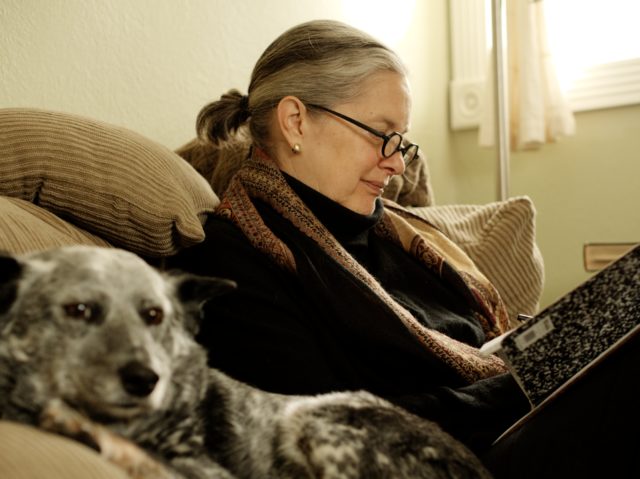
Art has come full circle for author Tod Davies, at least a portion of it has. This month, the fourth book in her History of Arcadia series, Report to Megalopolis: or The Post-modern Prometheus, hits shelves and a tiny voice Davies heard nearly 20 years ago finally gets a bullhorn.
“Arcadia is about trying to maintain a small world of happiness and partnership in the midst of an enormous world that insists on rolling over everything and being dominant no matter what it destroys,” Davies tells Boulder Weekly.
“We have reached the end of being able to dominate nature,” Davies continues. “At a certain point, it’s either give it up and die, or figure out how to work with it.”
Davies started working on the Arcadia series roughly 18 years ago; around the time she was producing two documentaries for Britain’s Channel 4 with partner Alex Cox, a filmmaker and former University of Colorado Boulder professor. First was 1999’s Kurosawa: The Last Emperor, a survey of the famed Japanese filmmaker and his films. Or, as Davies puts it: “The great individual genius documentary.”
Davies says she and Cox had no issue finding filmmakers and cineastes rhapsodic about the genius of Akira Kurosawa. But it was not their voices that changed Davies’ approach.
“[Kurosawa] is all about this one individual genius,” Davies recalls, “with this one little tiny voice, his daughter, going: ‘You know, whenever he would go away for a film, me and my mother and my siblings would go: Hooray! Hooray! He’s gone! He’s gone!’”
Davies would learn to hone in on that little voice. With her next documentary, 2000’s Emmanuelle: A Hard Look, the lens wasn’t focused on the one individual genius, but on the workers, all women, who were just trying to make a buck.
Emmanuelle was a popular French softcore series, initially starring Sylvia Kristel. Cheaply made, the Emmanuelle series was sneered at by cinephiles and academics; the same people, Davies points out, who praised the low-budget spaghetti Westerns. For Davies, the cultural acceptability of violence, while either dismissing or censoring sex, became repulsive.
At the center of this repulsion: James Ferman, the director of the British Board of Film Classification. As Davies recounts, Ferman sought to censor Emmanuelle once he discovered young women were routinely attending the films.
“He said he wanted to protect these young women,” Davies recounts. “Well, why didn’t anybody say there was nothing but young men going to see the spaghetti Westerns?”
For the documentary, Davies enlisted Nadine Strossen, then president of the American Civil Liberties Union, to debate Ferman.
“Strossen wiped the floor with him,” Davies says with pride.
As Strossen pointed out, Ferman’s censorship was just another way of controlling the women in the audience.
“Do these women have to be protected from this?” Davies says, recalling Strossen’s argument. “It’s their choice to go watch a rape scene. … It’s not the same as being raped. Any more than a boy going to see somebody cutting off somebody’s head [in a spaghetti Western] means that the boy’s going to go cut off somebody’s head.”
Channel 4 made Davies cut the debate between Ferman and Strossen. But a specific idea had taken root in Davies’ mind, one that would encourage her to keep listening to those tiny voices.
“In a lot of ways, that turn-of-the-century thing [Kurosawa released in 1999, Emmanuelle released in 2000] is what’s interesting to me,” Davies explains. “We’re coming out of the great individual man period, and we’re in the period of #MeToo, and we’re in the period of #TimesUp.”
Davies plans to address this period of change on Aug. 27, when she visits the International Film Series at CU for a free show. Kurosawa will be screened, as will extracts from Emmanuelle.
And for those wanting to hear more about Arcadia and Return to Megalopolis, Davies will be doing readings Sunday, Aug. 26 at BookBar in Denver and on Tuesday, Aug. 28 at Inkberry Books in Niwot. Both readings include a presentation on Mary Shelley’s Frankenstein, a key reference point for this installment in the Arcadia series.
“[Frankenstein] is a cry for partnership and a cry for humanity,” Davies says. “For recognizing the humanity of other people rather than using them for your own greatness.”
To borrow a commonly misquoted phrase: History may not repeat itself, but it often rhymes.
On the Bill: Tod Davies Reading & Signing. 5 p.m. Sunday, Aug. 26, BookBar 4280 Tennyson St., Denver, bookbardenver.com
Kurosawa: The Last Emperor with extracts from Emmanuelle: A Hard Look. 7:30 p.m. Monday, Aug. 27, International Film Series, Muenzinger Auditorium, University of Colorado Boulder, internationalfilmseries.com
Reading and author reception. 7 p.m. Tuesday, Aug. 28, Inkberry Books, 7960 Niwot Road, Suite B-3, Niwot, inkberrybooks.com














